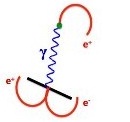twistor59 wrote:17 pages, and this was only episode 1.....
The Secrets of Quantum Physics
New BBC Documentary inadvertently promotes Idealism
Moderators: kiore, Blip, The_Metatron
Re: The Secrets of Quantum Physics
Kenny A. Chaffin
Art Gallery - Photo Gallery - Writing&Poetry
"Strive on with Awareness" - Siddhartha Gautama
Art Gallery - Photo Gallery - Writing&Poetry
"Strive on with Awareness" - Siddhartha Gautama
-

kennyc - Name: Kenny A. Chaffin
- Posts: 8698

- Country: U.S.A.

Re: The Secrets of Quantum Physics
I haven't seen any proper philosophy in this thread so far. Only wibble founded upon mangled physics.
Scarlett and Ironclad wrote:Campermon,...a middle aged, middle class, Guardian reading, dad of four, knackered hippy, woolly jumper wearing wino and science teacher.
-

campermon - RS Donator
- Posts: 17444
- Age: 54


Re: The Secrets of Quantum Physics
Evolving wrote:
I’m sorry to say that this is all a bit confused.
Starting with electric charge. First: the electromagnetic attraction between the negatively charged electrons and the positively charged nucleus is all that stops the atom from instantly flying apart. The idea that an electron doesn’t acquire charge until we measure it, is completely fanciful. There wouldn’t be any atoms if that were the case.
Second: measuring the charge of an electron by measuring the electric field that it generates is not the same thing as measuring its location. A free electron travelling through space generates an electric field which we can measure as it passes a test charge by the effect that it has on that test charge.
A travelling electron can be described as a wave packet, and you may remember my description of a wave packet as like a head moving under a blanket. A very large blanket. Maybe more like a parachute. Or a mouse crawling under a sheet.
I don’t really want to imagine a mouse under my sheet, but in the interests of science I suppose I am prepared to.
Anyway, observing the effect that the electric field of a travelling electron has on a test charge does not cause the wave function of that electron to “collapse” in the way that measuring its location does. It’s still a wave packet, which in principle stretches to infinity (the sheet is never completely resting on the mattress, no matter how far away you look, at any rate in our mathematical model), but it is very much concentrated in one region, and that is where we can observe the charge.
I keep putting the word “collapse” in scare quotes because I do want to stress that it is just a word. All we are doing when we perform a measurement of location is to change the values of the wave function so that they are only not equal to zero within a certain region. The electron is still the same physical object as it was before. It hasn’t become something that it wasn’t before, nor has it acquired qualities that it hadn’t before, and it certainly hasn’t now begun to exist for the first time; all we have done is to change some of the values of its qualities and thereby have an effect on its behaviour.
All this is already in the words that we have been using in previous posts, and it would be a lot clearer if we could point to the actual maths (apart from the purely practical difficulty that without Latex it’s very difficult to post any maths on this forum). That’s all I meant with my reference to the maths: I wasn’t trying to blind you with science or do some kind of lame appeal to my own authority. (Which is not high anyway: I’m quite lowly, as physicists go.) I don’t mind trying to explain it all using words alone. It’s good practice for when my daughter is interested in quantum mechanics (we’ve already started with astrophysics).
Though it does make the whole exercise feel a bit like being cross-examined: “You are asking us to believe that… I put it to you that…”
EDIT: grammar
Evolving.
Thanks for your posts. I'm learning a lot.
God is silly putty.
-

ElDiablo - Posts: 3128
- Country: USA

Re: The Secrets of Quantum Physics
evolving wrote:First: the electromagnetic attraction between the negatively charged electrons and the positively charged nucleus is all that stops the atom from instantly flying apart. The idea that an electron doesn’t acquire charge until we measure it, is completely fanciful. There wouldn’t be any atoms if that were the case.
But when people talk of 'measure' or 'collapse' they don't mean human beings right? They mean any other particle. So is it not the case that the nucleus of the atom is interacting with the electron this way? When Jamest says this or that property isn't decided until a measurement is done, isn't that referring to before the nucleus interacts with the electron? Whatever that means.
"A witty saying proves nothing." - Voltaire
-

Panderos - Posts: 2971

Re: The Secrets of Quantum Physics
twistor59 wrote:17 pages, and this was only episode 1.....
When you're drowning and all you have is a straw, all you can think about is the straw.
James realizes he can extend his legs to get his head out of the water but that would mean he wouldn't need the straw anymore. He loves that straw.
God is silly putty.
-

ElDiablo - Posts: 3128
- Country: USA

Re: The Secrets of Quantum Physics
Panderos wrote:evolving wrote:First: the electromagnetic attraction between the negatively charged electrons and the positively charged nucleus is all that stops the atom from instantly flying apart. The idea that an electron doesn’t acquire charge until we measure it, is completely fanciful. There wouldn’t be any atoms if that were the case.
But when people talk of 'measure' or 'collapse' they don't mean human beings right? They mean any other particle. So is it not the case that the nucleus of the atom is interacting with the electron this way? When Jamest says this or that property isn't decided until a measurement is done, isn't that referring to before the nucleus interacts with the electron? Whatever that means.
Each individual electron in an atom is described by a wave function: it is confined (to all intents and purposes) within the atom, but that atom is spacious enough to give plenty of room for waves. Each electron is a diffuse cloud of charge (as I said a bit earlier); each one has an expectation value at a particular place where a particle corresponding to that electron is most likely to be found if a measurement is made; but generally no measurement has been made, and the wave function has not collapsed.
How extremely stupid not to have thought of that - T.H. Huxley
-

Evolving - Name: Serafina Pekkala
- Posts: 12533

- Country: Luxembourg

Re: The Secrets of Quantum Physics
Does the nucleus interacting with the electron not count as collapsing the wavefunction of the electron then?
"A witty saying proves nothing." - Voltaire
-

Panderos - Posts: 2971

Re: The Secrets of Quantum Physics
No. Not every interaction causes wave function collapse.
edit: but obviously you're right that it doesn't need a human to cause a wave function to collapse!
edit: but obviously you're right that it doesn't need a human to cause a wave function to collapse!
How extremely stupid not to have thought of that - T.H. Huxley
-

Evolving - Name: Serafina Pekkala
- Posts: 12533

- Country: Luxembourg

Re: The Secrets of Quantum Physics
jamest already knows that, because he watched the video I posted way back on the first page regardng the "quantum eraser" experiment, and he said it had no bearing on his argument.
"A community is infinitely more brutalised by the habitual employment of punishment than it is by the occasional occurrence of crime." -Oscar Wilde
-

Shrunk - Posts: 26170
- Age: 59

- Country: Canada

Re: The Secrets of Quantum Physics
Panderos wrote:evolving wrote:First: the electromagnetic attraction between the negatively charged electrons and the positively charged nucleus is all that stops the atom from instantly flying apart. The idea that an electron doesn’t acquire charge until we measure it, is completely fanciful. There wouldn’t be any atoms if that were the case.
But when people talk of 'measure' or 'collapse' they don't mean human beings right? They mean any other particle. So is it not the case that the nucleus of the atom is interacting with the electron this way? When Jamest says this or that property isn't decided until a measurement is done, isn't that referring to before the nucleus interacts with the electron? Whatever that means.
They certainly don't mean human beings.
They don't mean "just" another particle either - they mean the "measuring apparatus". To measure charge, you'd need some apparatus more complex than another microscopic particle (think Milikan's oil drop expt).
However, charge is not the best example for talking about fundamental quantum measurement issues, because it's fixed once and for all - an electron can't evolve into a state with different charge (superselection). But spatial properties such as position, spin direction etc - they don't have definite values until a measurement is made. That, however, doesn't stop them from being physical and interacting with other particles. Quantum mechanics tells you how to compute such interactions, regardless of whether the particles involved are in states with definite positions/spin directions.
A soul in tension that's learning to fly
Condition grounded but determined to try
Can't keep my eyes from the circling skies
Tongue-tied and twisted just an earthbound misfit, I
Condition grounded but determined to try
Can't keep my eyes from the circling skies
Tongue-tied and twisted just an earthbound misfit, I
-

twistor59 - RS Donator
- Posts: 4966


Re: The Secrets of Quantum Physics
Evolving wrote:No. Not every interaction causes wave function collapse.
twistor59 wrote:They certainly don't mean human beings.
They don't mean "just" another particle either - they mean the "measuring apparatus". To measure charge, you'd need some apparatus more complex than another microscopic particle (think Milikan's oil drop expt).
Ok so what is needed to count as 'measuring apparatus' or cause 'collapse'?
"A witty saying proves nothing." - Voltaire
-

Panderos - Posts: 2971

Re: The Secrets of Quantum Physics
as was explained earlier there is no actual collapse, the particle potentially keeps moving, continuing to embody its wave function. The measurement is like a freeze-frame from an ongoing movie.
Kenny A. Chaffin
Art Gallery - Photo Gallery - Writing&Poetry
"Strive on with Awareness" - Siddhartha Gautama
Art Gallery - Photo Gallery - Writing&Poetry
"Strive on with Awareness" - Siddhartha Gautama
-

kennyc - Name: Kenny A. Chaffin
- Posts: 8698

- Country: U.S.A.

Re: The Secrets of Quantum Physics
Panderos wrote:Evolving wrote:No. Not every interaction causes wave function collapse.twistor59 wrote:They certainly don't mean human beings.
They don't mean "just" another particle either - they mean the "measuring apparatus". To measure charge, you'd need some apparatus more complex than another microscopic particle (think Milikan's oil drop expt).
Ok so what is needed to count as 'measuring apparatus' or cause 'collapse'?
People still argue about what *exactly* constitutes a measurement, but in the Copenhagen Interpretation, the apparatus has to be treatable as classical - not subject to the rules of quantum mechanics.
People also argue about what "collapse" really is. If forced to give an opinion, I suppose I'd espouse the view that it's a change in the state of knowledge about the system. i.e. I suppose I'm a Psi-epistemicist as opposed to a Psi-ontologist. But I'm only an engineer.
A soul in tension that's learning to fly
Condition grounded but determined to try
Can't keep my eyes from the circling skies
Tongue-tied and twisted just an earthbound misfit, I
Condition grounded but determined to try
Can't keep my eyes from the circling skies
Tongue-tied and twisted just an earthbound misfit, I
-

twistor59 - RS Donator
- Posts: 4966


The Secrets of Quantum Physics
kennyc wrote:as was explained earlier there is no actual collapse, the particle potentially keeps moving, continuing to embody its wave function. The measurement is like a freeze-frame from an ongoing movie.
I've been thinking about this and trying to think of this in terms I can understand. I believe the best way is to think of it as a graphical representation of sound with volume (v) on the y axis and time (t) on the x axis.
If we "look" at the value of v at any t we can know that value. What we can't know whether the value is on the way up or down and how fast because at that point the value of v at the next quanta of t is effectively all values.
The wave function is still there but it is unknown because we can only look at one quanta in isolation.
Is this a good analogy?
edit:words.
"Walla Walla Bonga!" — Witticism
-

felltoearth - Posts: 14762
- Age: 56

Re: The Secrets of Quantum Physics
...hmmmmm....
The wave function of a particle tells us about the probability of finding a particle at a particular point in space. So, the y axis is a measure of how likely we can 'observe' the particle at some co-ordinate x.
Until we make that measurement, or the system is forced to be measured (by some non-conscious observer), the only certainty we have is, is that the particle is most probably to be found 'here'.
The wave function of a particle tells us about the probability of finding a particle at a particular point in space. So, the y axis is a measure of how likely we can 'observe' the particle at some co-ordinate x.
Until we make that measurement, or the system is forced to be measured (by some non-conscious observer), the only certainty we have is, is that the particle is most probably to be found 'here'.
Scarlett and Ironclad wrote:Campermon,...a middle aged, middle class, Guardian reading, dad of four, knackered hippy, woolly jumper wearing wino and science teacher.
-

campermon - RS Donator
- Posts: 17444
- Age: 54


Re: The Secrets of Quantum Physics
twistor59 wrote:People still argue about what *exactly* constitutes a measurement, but in the Copenhagen Interpretation, the apparatus has to be treatable as classical - not subject to the rules of quantum mechanics.
People also argue about what "collapse" really is. If forced to give an opinion, I suppose I'd espouse the view that it's a change in the state of knowledge about the system. i.e. I suppose I'm a Psi-epistemicist as opposed to a Psi-ontologist. But I'm only an engineer.
Where is this knowledge? Presumably this is happening all the time in distant galaxies.
Also, more technical, but down-to-earth question: When you measure say, the energy of a particle, do you not collapse the wavefunction into an energy eigenstate from which it then continues in a time-dependent way? But with the energy now fixed until that particle interacts with something else, or you measure some other property and thus put it into an appropriate eigenstate of that thing? [And then if you measured the energy again you might get something different]. I remember thinking that was how it worked but never being sure if I was right.
"A witty saying proves nothing." - Voltaire
-

Panderos - Posts: 2971

Re: The Secrets of Quantum Physics
Panderos wrote:twistor59 wrote:People still argue about what *exactly* constitutes a measurement, but in the Copenhagen Interpretation, the apparatus has to be treatable as classical - not subject to the rules of quantum mechanics.
People also argue about what "collapse" really is. If forced to give an opinion, I suppose I'd espouse the view that it's a change in the state of knowledge about the system. i.e. I suppose I'm a Psi-epistemicist as opposed to a Psi-ontologist. But I'm only an engineer.
Where is this knowledge? Presumably this is happening all the time in distant galaxies.
It's in the (classical) pointer state of the measuring apparatus. There has to be something irreversible (in the thermodynamic sense) about this sort of measuring process. So although a real measuring apparatus is actually made of quantum things, and is subject to quantum rules, it has to be capable of in some sense chucking away all those quantum features in order to "have made a measurement". The system+apparatus is surrounded by an enivornment in which it lives, and with which it interacts. It is through this interaction that all the quantum entanglements leak away. This is what is behind the decoherence program. There's all sorts of stuff there about "Einselection" and "pointer bases" which I only vaguely understand.
Panderos wrote:
Also, more technical, but down-to-earth question: When you measure say, the energy of a particle, do you not collapse the wavefunction into an energy eigenstate from which it then continues in a time-dependent way? But with the energy now fixed until that particle interacts with something else, or you measure some other property and thus put it into an appropriate eigenstate of that thing? [And then if you measured the energy again you might get something different]. I remember thinking that was how it worked but never being sure if I was right.
Yes, the energy eigenstates are eigenstates of the Hamiltonian, and if the Hamiltonian is time dependent (which is presumably what you mean by "interacts with something else", then just after an energy measurement, you've put the particle into an energy eigenstate, but some time later, because the Hamiltonian has changed, it will no longer necessarily be an energy eigenstate.
A soul in tension that's learning to fly
Condition grounded but determined to try
Can't keep my eyes from the circling skies
Tongue-tied and twisted just an earthbound misfit, I
Condition grounded but determined to try
Can't keep my eyes from the circling skies
Tongue-tied and twisted just an earthbound misfit, I
-

twistor59 - RS Donator
- Posts: 4966


Re: The Secrets of Quantum Physics
Panderos wrote:twistor59 wrote:People still argue about what *exactly* constitutes a measurement, but in the Copenhagen Interpretation, the apparatus has to be treatable as classical - not subject to the rules of quantum mechanics.
People also argue about what "collapse" really is. If forced to give an opinion, I suppose I'd espouse the view that it's a change in the state of knowledge about the system. i.e. I suppose I'm a Psi-epistemicist as opposed to a Psi-ontologist. But I'm only an engineer.
Where is this knowledge? Presumably this is happening all the time in distant galaxies.
Also, more technical, but down-to-earth question: When you measure say, the energy of a particle, do you not collapse the wavefunction into an energy eigenstate from which it then continues in a time-dependent way? But with the energy now fixed until that particle interacts with something else, or you measure some other property and thus put it into an appropriate eigenstate of that thing? [And then if you measured the energy again you might get something different]. I remember thinking that was how it worked but never being sure if I was right.
Firstly, there is a good reason why apparatus is always treated as classical - that is that the size and mass of the apparatus is not in the quantum domain, unless the experimenter is very, very small!
Eigenstates cannot extend across the universe, Panderos. Even at 3K (the temperature of space) coherence lengths will be way, way too small.
May The Voice be with you!
- DavidMcC
- Name: David McCulloch
- Posts: 14913
- Age: 70

- Country: United Kigdom

Re: The Secrets of Quantum Physics
twistor59 wrote:It's in the (classical) pointer state of the measuring apparatus. There has to be something irreversible (in the thermodynamic sense) about this sort of measuring process. So although a real measuring apparatus is actually made of quantum things, and is subject to quantum rules, it has to be capable of in some sense chucking away all those quantum features in order to "have made a measurement". The system+apparatus is surrounded by an enivornment in which it lives, and with which it interacts. It is through this interaction that all the quantum entanglements leak away. This is what is behind the decoherence program. There's all sorts of stuff there about "Einselection" and "pointer bases" which I only vaguely understand.
Bit beyond me really. Would the takeaway for the thread be that particles are really interacting even before any measurement is made upon them? Then what was with J-A-K's statement about the moon not being there when you don't look?
twistor59 wrote:Yes, the energy eigenstates are eigenstates of the Hamiltonian, and if the Hamiltonian is time dependent (which is presumably what you mean by "interacts with something else", then just after an energy measurement, you've put the particle into an energy eigenstate, but some time later, because the Hamiltonian has changed, it will no longer necessarily be an energy eigenstate.
OK, I think I get this bit
"A witty saying proves nothing." - Voltaire
-

Panderos - Posts: 2971

Re: The Secrets of Quantum Physics
Panderos wrote:Bit beyond me really. Would the takeaway for the thread be that particles are really interacting even before any measurement is made upon them? Then what was with J-A-K's statement about the moon not being there when you don't look?
Metaphor!
-

Thommo - Posts: 27477
Who is online
Users viewing this topic: No registered users and 1 guest